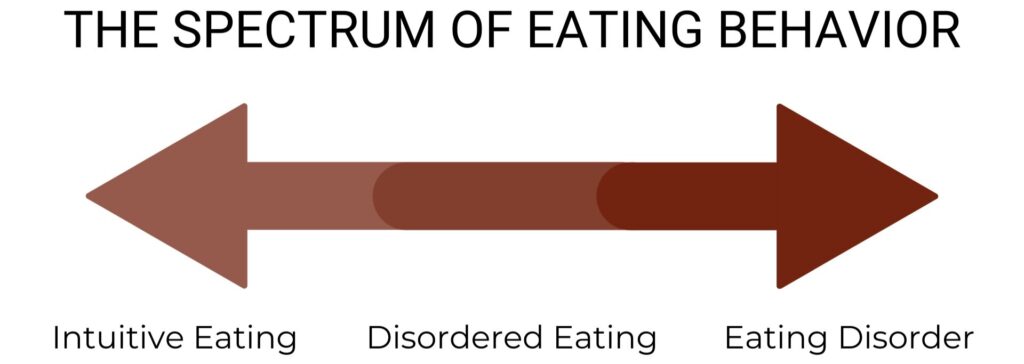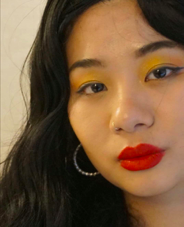For anyone who has ever struggled with an eating disorder or any form of disordered eating, it is apparent that abnormal eating severely impairs your ability to listen to and trust your intuition and your body. Eating disorders inherently involve behaviors and habits that contradict your body’s natural instincts for survival and wellness. Diet culture tells us that restricting what and when we eat, shrinking our portions, ignoring our hunger signals, and avoiding certain foods are health-promoting behaviors. Developing a healthy relationship with food through intuitive eating is the most effective and sustainable approach to achieving food freedom.
by: Enchi Dai
Do you ever feel uncomfortable around food? Is it hard for you to trust your body to make food choices? If your answer is yes—today I am going to share a secret with you about how to stop judging your food choices and learn to trust your internal hunger and fullness cues.

Eating behaviors can be described using a spectrum ranging from Eating Disorders to Intuitive Eating. You may be asking, “What is Intuitive Eating?” As indicated in the name, Intuitive Eating is an approach to eating that emphasizes trust in your intuition when it comes to food. It is characterized by eating without judgment, allowing for indulgences, eating when you feel hungry, and stopping when you feel satisfied — understanding that it is normal and permissible to eat past comfortable fullness. We were born with the innate ability to know when we need to eat, how much we need to eat, and what type of food we need to eat. However, we have been told by diet culture that we should go against our intuition and ignore our hunger & fullness cues by engaging in fad dieting and other restrictive behaviors. Neglecting our body by constantly ignoring its needs can cause serious health consequences and may lead to disordered eating and even eating disorders. It does not matter where you are on the spectrum. Our goal is always to move from the right side of the spectrum to the left side of the spectrum. But how?
The intuitive eating philosophy was developed by registered dietitian Evelyn Tribole and Elyse Resch in 1995. They compiled a list of 10 key principles in their book, Intuitive Eating: A Revolutionary Program that Works.

1. Reject the diet mentality: The ‘diet mentality’ is a false belief that dieting for weight loss will result in improved health and happiness. However, assigning a moral code to certain foods and constantly going against our body’s natural instincts is harmful to all aspects of our health and wellbeing. Intuitive eating is the most sustainable approach to improving overall health and wellbeing.
2. Honor your hunger: Hunger is not your enemy. Respond to early signs of hunger by feeding your body. If you let yourself get excessively hungry, your body is less able to function properly and it will be more difficult for you to listen to your body’s needs.
3. Make peace with food: Call a truce in the war with food. Get rid of ideas about what you should or should not eat.
4. Challenge the food police: Food is not ‘good’ or ‘bad’, and you are not a ‘good’ or ‘bad’ person for what you choose to eat or not eat. Food has no moral value. Challenge thoughts that tell you otherwise.
5. Discover the satisfaction factor: Satisfaction plays a major role in fullness. You can eat an entire meal’s worth of food and still feel peckish afterward if the meal was not satisfying. Make your eating experience enjoyable! Have a meal that you enjoy, tastes good, and nourishes your body. When you make eating a pleasurable experience, you might find it takes less food to satisfy you.
6. Respect your fullness: Just as your body tells you when it is hungry, it also tells you when it is full. Listen for the signals of comfortable fullness, when you feel you have had enough. It is important to recognize that fullness is not a rigid rule to follow. Fullness will look and feel different every single day and it is normal to eat beyond comfortable fullness.
7. Cope with Your Emotions with Kindness: Emotional eating is a strategy for coping with feelings. While there is nothing inherently wrong with using food as a coping mechanism, it can become problematic if eating is the only coping mechanism that one uses to deal with strong emotions. Numbing these feelings with food will not fix the problem. Find other productive ways that are not related to food to help you deal with the source of the emotion.: take a walk, meditate, or call a friend.
8. Respect your body: Rather than criticizing your body for how it looks and what you perceive is wrong with it, recognize it as capable and beautiful, just as it is. All bodies are worthy of love and respect!
9. Exercise—feel the difference: Find ways to move your body that you enjoy. Shift the focus from losing weight to feeling energized, strong, and alive.
10. Honor your health—gentle nutrition: The food you eat should taste good and feel good. Remember that it is your overall food patterns that shape your health. One meal or snack is not going to make or break your health.
I want to point out that learning to totally trust ourselves around food and eat without any judgment can be a hard and slow process, especially at the beginning of your journey. Sometimes, you may feel like you are doing great, but other times you may fall right back into a diet culture mindset. Give yourself time and permission to embrace every step of the way — you will get there and it will be worth it!
At BALANCE eating disorder treatment center, we offer a variety of courses and webinars that will help you heal your relationship with food. In our Intuitive Eating Webinar, you will dive deeper into the 10 principles of Intuitive Eating in order to discover freedom from diet culture and a healthier relationship with food and your body. In our Individual Nutrition Counseling sessions, you will work closely with our highly trained Registered Dietitians to customize a program specific to your needs. Whether you are challenged with an eating disorder or looking for nutrition counseling, we can help you. This program is designed to help clients move from structured eating to intuitive eating, reduce food and body image anxiety, increase hunger and satiety awareness, and develop a program that works with your lifestyle. Click the button below to browse our full selection of programs & services.
Looking for eating disorder treatment programs or services in the New York City area? Learn more about our options at BALANCE eating disorder treatment center here or contact us here.

This post was written by BALANCE Blog Intern, Enchi Dai.
Enchi is a Bachelor’s-Master’s student at New York University, majoring in Psychology. After her recovery from disordered eating, Enchi became passionate about spreading ED awareness, advocating for intuitive eating, and promoting Health at Every Size. Enchi is also an ACE Certified Personal Trainer and Registered Yoga Teacher (RYT 200). Her goal is to help people become healthier both physically and mentally, instead of encouraging them to pursue a certain body image. Along with her internship at BALANCE, Enchi works as a Research Assistant and Crisis Counselor to prepare herself for the future career as a Clinical/Counseling Psychologist.





